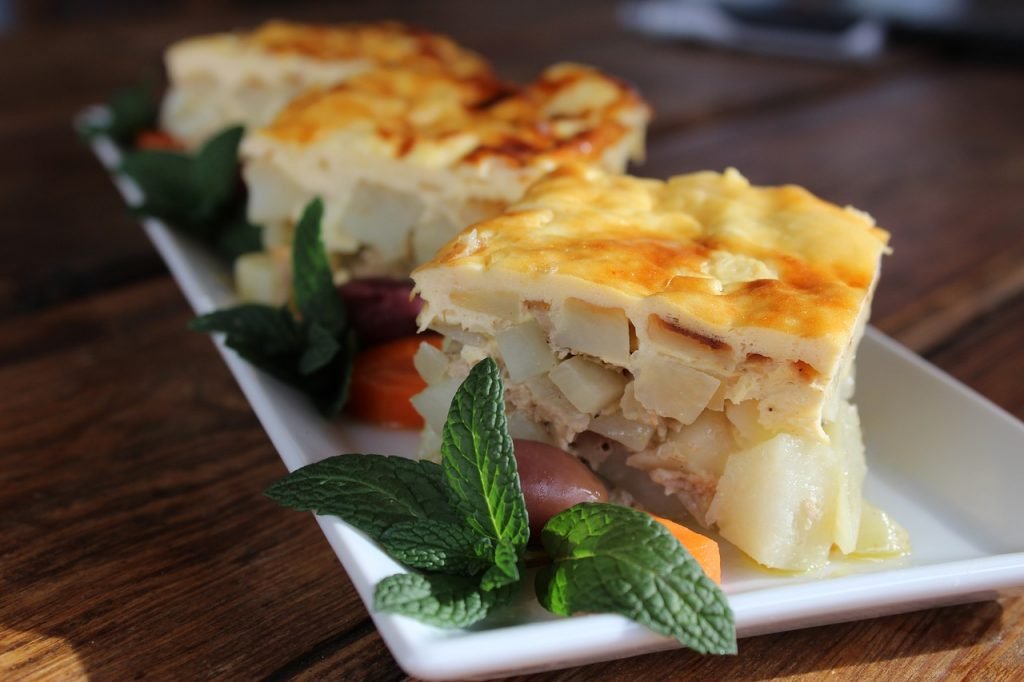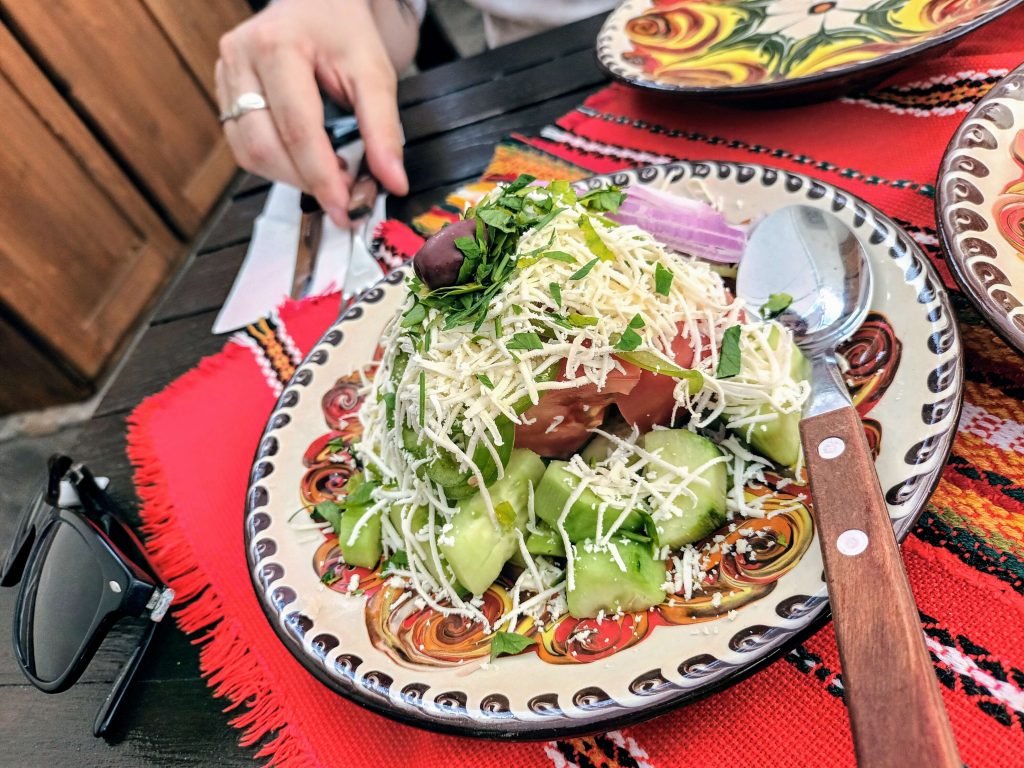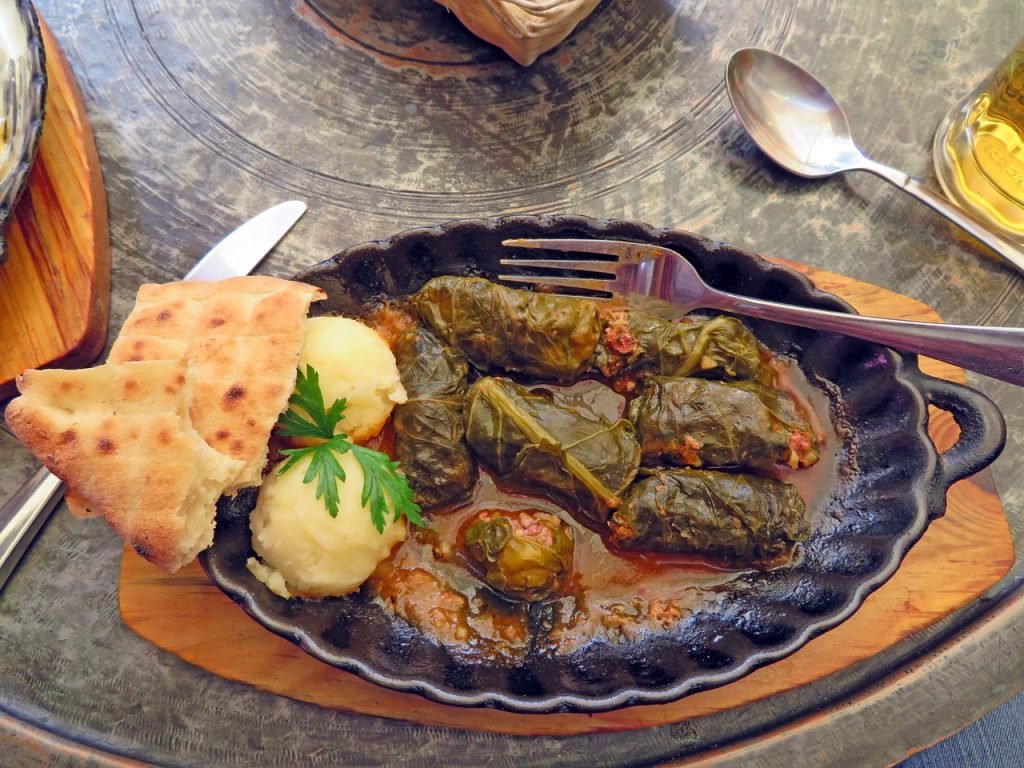Traditional Bulgarian Food – 19 Bulgarian Dishes You Can’t Miss
Despite Bulgaria having been an EU member state for over 10 years, this Eastern European country is still relatively undiscovered by tourists, especially if you discount popular seaside resorts like Sunny Beach.
However, with traditional mountain towns, breathtaking landscapes, medieval cities and tonnes of culturally significant places to visit, Bulgaria truly qualifies as a hidden gem, and it is one of those countries where there really is something for everyone.
So, whether you’re a keen skier, a city break addict or a self-professed beach bum, this Bulgarian food guide will tell you all you need to know about Bulgarian cuisine so that wherever you end up on your trip, you’ll definitely be prepared when it’s time to eat!
What is traditional Bulgarian food like?
Like most Balkan food, Bulgarian food is heavily centred around meat, meat, and more meat (although you can definitely find veggie-friendly options too!).
Bulgarian food is real comfort food, the kind that fills the belly and warms the soul, and ingredients here are often completely organic, with restaurants either growing their own produce or buying super local (as in, from their next door neighbour).
The most common meats that Bulgarians eat are pork, chicken, veal and lamb – beef is not as popular in Bulgaria as it is elsewhere in the world as cattle are primarily raised for their milk.
The meat is usually grilled or slow cooked in rich stews.
Meat skewers are also popular, and usually come with onions, peppers and tomatoes.
Vegetables are either grilled or roasted, and the most popular vegetables you’ll find are eggplant, zucchini, peppers and onions.
While most Bulgarian dishes remain the same across the company, there are definitely regional differences that you will find, from the hearty mountain food in Bansko to the fresh seafood along the coast.
Fun fact: Bulgaria is one of the oldest wine making countries in the world!
19 Traditional Bulgarian Foods
1. Banitsa
Banitsa is a quintessential Bulgarian breakfast food and is made from whisked eggs, natural yoghurt and crushed white cheese, sandwiched in-between flaky filo pastry which has been baked in the oven.
While cheese is definitely the most popular filling, here are many alternatives including spinach, minced meat and pumpkin.
Usually, a breakfast banitsa would be served with aryan, which is a savoury yoghurt drink.

2. Lyutenitsa
Lyutenitsa is a thick relish of tomatoes and peppers and it is probably one of the most treasured Bulgarian foods out there.
Although these days it can be found on every supermarket shelf, the best lyutenitsa is made at home in autumn, and most Bulgarians will have fond memories of the smell of roasting peppers coming from their mothers’ kitchens!
Lyutenitsa is made with tomatoes, peppers, onions, garlic and cumin, and is ever so mildly spicy.
Toast without lyutenitsa in Bulgaria is like tea without biscuits in England!
3. Kebapche
Very similar to the ćevapčići that can be found all around the former Yugoslavian countries, a kebapche is a long piece of grilled mince meat (usually pork and beef), flavoured with black pepper and cumin, that is similar in shape and size to a hot dog.
You will never have just one kebapche. You will usually have a handful, along with a side such as fries, salad, or lyutenitsa (more on that later) and a cold beer.
4. Mekitsa
Another Bulgarian breakfast dish (especially popular in the mountains) is mekitsa, which is made from balls of kneaded dough that are deep-fried, a little bit like little donuts or sweet Yorkshire puddings!
Also found in North Macedonia and Serbia, mekitsa are usually dusted with icing sugar and served with jam, honey or white Sirene cheese.
5. Meshana Skara
Meshana Skara is what we would call a mixed grill, and it typically consists of kebapche, kyufte (meatballs), pork steaks and skewers, and sausages, grilled to perfection and served with fries, bean salad and chopped onions.

6. Musaka
While traditional Greek moussaka is a casserole dish made with ground beef, eggplant and egg topped with a tomato sauce, Bulgarian musaka replaces the eggplant with potatoes, creating a much heavier and more substantial meal.
The tomato sauce is often swapped out for cheese and the whole thing is traditionally covered with thick Bulgarian yoghurt on top, making Bulgarian musaka an entirely new dish!
For me, Bulgarian musaka tastes a little bit like Shepherd’s Pie, making it the perfect food for those cold winter nights.

7. Lukanka
Lukanka is a cured sausage with a strong flavour and an even stronger smell.
The sausage itself is often made with pork or veal and seasoned with black pepper, cumin and salt.
For the best lukanka in Bulgaria, head to the mountains.

8. Kapama
Another one for the meat lovers out there, kapama is usually prepared around Christmas and New Year and consists of sausage, rabbit, chicken, veal, and whatever else you can think of, cooked on a slow fire for up to 5 hours and served in a clay dish with sides of fries, salad, grilled peppers and lyutenitsa.
Meshana Skara is found on the menus of pretty much every restaurant in the mountain town of Bansko, and is perfect with a pint of cold beer after a long day on the slopes.
9. Shopska Salad
Although you will find it all over the Balkans, Shopska Salad, or Šopska salata, actually hails from Bulgaria.
This internationally-renowned dish is a simple and fresh salad that is typically served as a side dish and consists of chopped tomatoes, bell pepper, cucumber and red onion topped with white Sirene cheese.
Seasoning is simple, with just a little parsley, salt and sunflower oil.
Shopska Salad is perfect for those hot summer afternoons when you want a break from the stodgier Bulgarian foods, and while I would usually order it at lunchtime as a main dish, Bulgarians tend to order it as a starter with a shot of rakia.

10. Tarator Soup
Tarator is an unusual soup in that it is served cold.
Made from cucumber and natural yoghurt with garlic and dill to add flavour, it is light and refreshing in the hot summer months, similar to gazpacho in Spain.

11. Grilled fish
Grilled fish is a summer staple in many regions in the Balkans, and if you want to find it in Bulgaria, just head to the Black Sea coast!
The fish will be served whole (you will need to debone it yourself) and seasoned with domestic olive oil, lemon, herbs, and salt.
Grilled fish is typically served with chunky chips and salad.
12. Shkembe chorba
Translating to Dragon’s Breath (yes, really), shkembe chorba is a soup made with tripe (similar to the Polish soup flaki), which is prepared by boiling tripe for several hours with milk, oil, and paprika.
The soup is then generously spiced and seasoned with garlic, vinegar, oil, and copious amounts of salt and hot red pepper.
Known to be a hangover cure, this soup is only for the brave.
13. Kiselo mlyako
Kiselo mlyako is one of the foods in Bulgaria that you will find absolutely everywhere.
Kiselo mlyako is a yoghurt that contains two different types of healthy probiotic bacteria, and its process actually dates back over 4000 years!
While it has a slightly sour taste, it is mild and creamy overall and goes with just about anything (as you’ll find out when you visit Bulgaria!).
You will find this yoghurt served in soups, salads, desserts and as dips to accompany the piles of grilled meat that you’re bound to indulge in.
14. French fries with Sirene cheese
As you might have noticed by now, heaping Sirene cheese on top of absolutely everything is the way things are done in Bulgaria, and every restaurant menu you’ll come across will have this staple on it (usually translated to ‘fries with white cheese’).
It’s definitely a simple dish, but until you’ve tried freshly-fried chips with Sirene cheese sprinkled on the top, you haven’t lived.
15. Bob Chorba
Bob Chorba is a delicious white bean soup cooked and served in a clay pot and usually made with peppers, carrots, onions, and tomatoes.
Sometimes it includes cured sausage, but more often than not, this is one of the few vegan Bulgarian dishes you’ll find.

16. Sarmi
Sarmi is the name given to stuffed vine or pickled cabbage rolls, which are popular all over the Balkans, including Bulgaria.
They are typically filled with rice or a combination of rice and minced meat, along with onions, carrots, and various spices.
Although sarmi can be enjoyed as a starter or main course all year round, they are a staple feature of Bulgarian Christmas Eve dinners!

17. Kavarma
Kavarma is a slow-cooked thick and hearty stew cooked in a clay pot.
It is traditionally made using pork, but you can also find beef and chicken depending on where you are in the country. As well as meat, you will find peppers, tomatoes, onions, mushrooms, leeks, carrots, wine.
18. Kufte
Kufte is a classic Bulgarian BBQ food, and is essentially a meat patty (pork, veal, beef, or a combination of all 3!) seasoned with salt, pepper, cumin, onions, and parsley.
They are grilled, baked or fried, and often served with a thick hunk of crusty bread and a shopska salad.

19. Rakia
Although it’s technically a drink, I couldn’t write a post about traditional Bulgarian food without including the infamous RAKIA, a kind of fruit brandy produced all over the Balkans that starts at about 40% ABV but can go much, much higher.
Rakia comes in all different flavours, from honey (my favourite) to quince (my least favourite), and the plum rakia, which is the ‘plain’ or basic version.
It is practically a religion to drink rakia in Bulgaria, and unless you’ve been utterly defeated by it at least once, you haven’t been to the Balkans.
Traditional Bulgarian Food | Final Thoughts
So, that brings us to the end of traditional Bulgarian foods you simply have to try!
While Bulgarian cuisine may seem very meat-centric at first, you don’t have to look far to find vegetarian and even vegan options in Bulgaria.
While huge platters full of grilled meats are definitely the order of the day, you don’t have to look far to find an abundance of colourful salads, stuffed veggies and the freshest seafood you will ever taste.
Everything in Bulgaria is rich, hearty and brimming with flavour, and Bulgaria is one of the few European countries left where organic truly does mean organic!
Bulgarian food might not be world famous, and you may not have been able to name a single Bulgarian dish before you read this article, but trust me when I say that Bulgarian food really does have a lot to offer, and if you visit Bulgaria in search of a good meal, you won’t be disappointed!
That’s all for now, but as always, if you have any questions, please don’t hesitate to leave them in the comments section below and I will get back to you!
Until next time,
XOXO
If you like this article and would like to support my work, please click the button above to donate a couple of bucks and buy me a coffee. The revenue that I receive on this website is minimal, so support from my readers enables me to keep creating content that you (hopefully!) love to read.
Disclaimer: This page contains affiliate links. If you make a purchase on a recommended site, I may earn a commission at no extra cost to you.

You missed the thicker tarator that is used like a salad, and also the wonderful lokym candies!
Ooh, thanks!